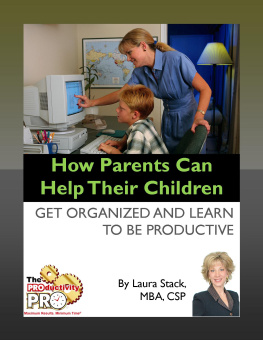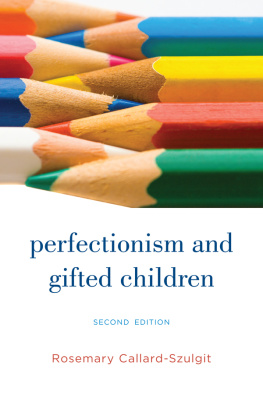A Richard Todd Book
Houghton Mifflin Company / Boston
1989
Copyright 1989 by John Tracy Kidder
ALL RIGHTS RESERVED
For information about permission to reproduce selections from
this book, write to Permissions, Houghton Mifflin Company,
2 Park Street, Boston, Massachusetts 02108.
Library of Congress Cataloging-in-Publication Data
Kidder, Tracy.
Among schoolchildren / Tracy Kidder,
p. cm.
"A Richard Todd book."
ISBN 0-395-47591-0
1. Elementary school teachingUnited StatesCase studies.
2. Fifth grade (Education)United StatesCase studies. I. Title.
LB 1776. K 48 1989 89-34378
372.11'02'0973dc20 CIP
P 10 9 8 7 6 5 4 3 2 1
Printed in the United States of America
Book design by Robert Overholtzer
Author's Note: This is a work of nonfiction. I have changed
the names of the children and of the student teacher;
Eduardo is also a pseudonym.
A signed first edition of this book has been
privately printed by the Franklin Library.
For Reine Marie Melanie Kidder
Syosset High School English Department, 19601981
September
Mrs. Zajac wasn't born yesterday. She knows you didn't do your best work on this paper, Clarence. Don't you remember Mrs. Zajac saying that if you didn't do your best, she'd make you do it over? As for you, Claude, God forbid that you should ever need brain surgery. But Mrs. Zajac hopes that if you do, the doctor won't open up your head and walk off saying he's almost done, as you just said when Mrs. Zajac asked you for your penmanship, which, by the way, looks like who did it and ran. Felipe, the reason you have hiccups is, your mouth is always open and the wind rushes in. You're in fifth grade now. So, Felipe, put a lock on it. Zip it up. Then go get a drink of water. Mrs. Zajac means business, Robert. The sooner you realize she never said everybody in the room has to do the work except for Robert, the sooner you'll get along with her. And ... Clarence. Mrs. Zajac knows you didn't try. You don't just hand in junk to Mrs. Zajac. She's been teaching an awful lot of years. She didn't fall off the turnip cart yesterday. She told you she was an old-lady teacher.
She was thirty-four. She wore a white skirt and yellow sweater and a thin gold necklace, which she held in her fingers, as if holding her own reins, while waiting for children to answer. Her hair was black with a hint of Irish red. It was cut short to the tops of her ears, and swept back like a pair of folded wings. She had a delicately cleft chin, and she was shortthe children's chairs would have fit her. Although her voice sounded conversational, it had projection. She had never acted. She had found this voice in classrooms.
Mrs. Zajac seemed to have a frightening amount of energy. She strode across the room, her arms swinging high and her hands in small fists. Taking her stand in front of the green chalkboard, discussing the rules with her new class, she repeated sentences, and her lips held the shapes of certain words, such as "homework," after she had said them. Her hands kept very busy. They sliced the air and made karate chops to mark off boundaries. They extended straight out like a traffic cop's, halting illegal maneuvers yet to be perpetrated. When they rested momentarily on her hips, her hands looked as if they were in holsters. She told the children, "One thing Mrs. Zajac expects from each of you is that you dolour best." She said, "Mrs. Zajac gives homework. I'm sure you've all heard. The only meanie gives homework." Mrs. Zajac. It was in part a role. She worked her way into it every September.
At home on late summer days like these, Chris Zajac wore shorts or blue jeans. Although there was no dress code for teachers here at Kelly School, she always went to work in skirts or dresses. She dressed as if she were applying for a job, and hoped in the back of her mind that someday, heading for job interviews, her students would remember her example. Outside school, she wept easily over small and large catastrophes and at sentimental movies, but she never cried in front of students, except once a few years ago when the news came over the intercom that the Space Shuttle had exploded and Christa McAuliffe had diedand then she saw in her students' faces that the sight of Mrs. Zajac crying had frightened them, and she made herself stop and then explained.
At home, Chris laughed at the antics of her infant daughter and egged the child on. She and her first-grade son would sneak up to the radio when her husband wasn't looking and change the station from classical to rock-and-roll music. "You're regressing, Chris," her husband would say. But especially on the first few days of school, she didn't let her students get away with much. She was not amused when, for instance, on the first day, two of the boys started dueling with their rulers. On nights before the school year started, Chris used to have bad dreams: her principal would come to observe her, and her students would choose that moment to climb up on their desks and give her the finger, or they would simply wander out the door. But a child in her classroom would never know that Mrs. Zajac had the slightest doubt that students would obey her.
The first day, after going over all the school rules, Chris spoke to them about effort. "If you put your name on a paper, you should be proud of it," she said. "You should think, This is the best I can do and I'm proud of it and I want to hand this in." Then she asked, "If it isn't your best, what's Mrs. Zajac going to do?"
Many voices, most of them female, answered softly in unison, "Make us do it over."
"Make you do it over," Chris repeated. It sounded like a chant.
"Does anyone know anything about Lisette?" she asked when no one answered to that name.
Felipesmall, with glossy black hairthrew up his hand.
"Felipe?"
"She isn't here!" said Felipe. He wasn't being fresh. On those first few days of school, whenever Mrs. Zajac put the sound of a question in her voice, and sometimes before she got the question out, Felipe's hand shot up.
In contrast, there was the very chubby girl who sat nearly motionless at her desk, covering the lower half of her face with her hands. As usual, most of their voices sounded timid the first day, and came out of hiding gradually. There were twenty children. About half were Puerto Rican. Almost two-thirds of the twenty needed the forms to obtain free lunches. There was a lot of long and curly hair. Some boys wore little rattails. The eyes the children lifted up to her as she went over the rulesa few eyes were blue and many more were brownlooked so solemn and so wide that Chris felt like dropping all pretense and laughing. Their faces ranged from dark brown to gold, to pink, to pasty white, the color that Chris associated with sunless tenements and too much TV. The boys wore polo shirts and T-shirts and new white sneakers with the ends of the laces untied and tucked behind the tongues. Some girls wore lacy ribbons in their hair, and some wore pants and others skirts, a rough but not infallible indication of religionthe daughters of Jehovah's Witnesses and Pentecostals do not wear pants. There was a lot of prettiness in the room, and all of the children looked cute to Chris.
So did the student teacher, Miss Hunt, a very young woman in a dress with a bow at the throat who sat at a table in the back of the room. Miss Hunt had a sweet smile, which she turned on the children, hunching her shoulders when they looked at her. At times the first days, while watching Chris in action, Miss Hunt seemed to gulp. Sometimes she looked as frightened as the children. For Chris, looking at Miss Hunt was like looking at herself fourteen years ago.
The smell of construction paper, slightly sweet and forest-like, mingled with the fading, acrid smell of roach and rodent spray. The squawk box on the wall above the closets, beside the clock with its jerky minute hand, erupted almost constantly, adult voices paging adults by their surnames and reminding staff of deadlines for the census forms, attendance calendars, and United Way contributions. Other teachers poked their heads inside the door to say hello to Chris or to ask advice about how to fill out forms or to confer with her on schedules for math and reading. In between interruptions, amid the usual commotion of the first day, Chris taught short lessons, assigned the children seat work, and attended to paperwork at her large gray metal desk over by the window.
Next page






